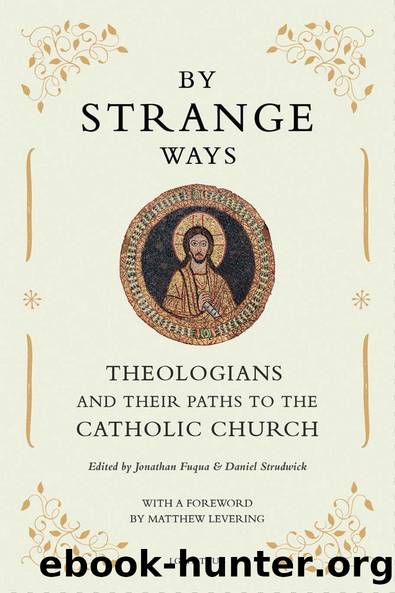By Strange Ways by Jonathan Fuqua Daniel Strudwick

Author:Jonathan Fuqua, Daniel Strudwick [Jonathan Fuqua, Daniel Strudwick]
Language: eng
Format: epub
ISBN: 9781642292374
Goodreads: 74877420
Publisher: Ignatius Press
Published: 2022-10-23T16:00:00+00:00
2. The Turn to Rome
All of this came to a head when I attended a conference on Karl Barth and Thomas Aquinas. The conference, billed as an âunofficial Protestant-Catholic dialogueâ, consisted mostly of Barthian Protestants and Thomist Catholics. I attended the conference in the spirit of an outsider. The Barthian project held little appeal to me, and the Catholic Church was, to my mind, still the Church of the Antichrist. In fact, I was beginning to regard the entire project of Christian theology as tendentious. As a traditional Reformed Protestant, I found myself much more sympathetic to the Thomists than to the Barthians. Yet, I was beginning to see that those aspects of traditional Christianity that I had received through the Reformed tradition could only exist and thrive when rooted in their original source, the Catholic Church.
More than anything else, it was through a providential encounter with one Dominican theologian that I recall the definitive beginnings of a turn, a conversio. I was curious to hear how exactly a Catholic theologian would respond to the various and sundry objections against Rome that I had been taught. Thus, I approached Father Thomas Joseph White and unloaded all the major objections that, I thought, should have prevented any reasonable person from being a Roman Catholic. Beyond the substance of his responses, which were compelling enough, I was able to attain a glimpse of my own tradition from the outside, more precisely, from the perspective of Rome. While I had hitherto approached opposing views from within, I had resolutely refused to do this with Catholicism. Yet, for the first time, I was struck by the possibility that it was I, as a Protestant, who was in error. In continued contact with Father Thomas Joseph White, I began to search the Catholic tradition from within.
As I studied Catholic theology, I began to see that the seemingly intractable problems I encountered in and through modern philosophy and theology were, in fact, rooted in the Reformation itself. My quarrel was not with Christianity as a whole, and certainly not with Rome, but with Protestantism alone. It was at this time that I began to consider more seriously a point of one of my church history professors, namely, that the via moderna or ânominalismâ of late medieval Scholasticism formed the necessary condition for Lutherâs doctrine of justification.4 In making such a claim, my professor merely intended to provide a historical basis for the Reformed traditionâs catholicity; yet, in it, I found something more disquieting. Was it not possible to see in Lutherâs own reforms, in Protestantism as a whole, an approach to Scripture that was, in fact, based not on Scripture alone, but on purely human assumptions about reality? In other words, was not Lutherâs own Herculean attempt at âScripture aloneâ curtailed at the outset by his own philosophical assumptions?
A closer look at the immediate medieval background of the Reformation showed this to be incontrovertibly true. While Luther, a self-professed Occamite, was reacting most of all to
Download
This site does not store any files on its server. We only index and link to content provided by other sites. Please contact the content providers to delete copyright contents if any and email us, we'll remove relevant links or contents immediately.
| Military | Political |
| Presidents & Heads of State | Religious |
| Rich & Famous | Royalty |
| Social Activists |
Waking Up in Heaven: A True Story of Brokenness, Heaven, and Life Again by McVea Crystal & Tresniowski Alex(37808)
Empire of the Sikhs by Patwant Singh(23085)
We're Going to Need More Wine by Gabrielle Union(19046)
Hans Sturm: A Soldier's Odyssey on the Eastern Front by Gordon Williamson(18590)
Leonardo da Vinci by Walter Isaacson(13336)
The Radium Girls by Kate Moore(12028)
Tools of Titans by Timothy Ferriss(8395)
Educated by Tara Westover(8054)
How to Be a Bawse: A Guide to Conquering Life by Lilly Singh(7486)
Permanent Record by Edward Snowden(5847)
The Last Black Unicorn by Tiffany Haddish(5635)
The Rise and Fall of Senator Joe McCarthy by James Cross Giblin(5280)
Promise Me, Dad by Joe Biden(5153)
The Wind in My Hair by Masih Alinejad(5095)
A Higher Loyalty: Truth, Lies, and Leadership by James Comey(4963)
The Crown by Robert Lacey(4815)
The Iron Duke by The Iron Duke(4354)
Joan of Arc by Mary Gordon(4110)
Stalin by Stephen Kotkin(3965)
